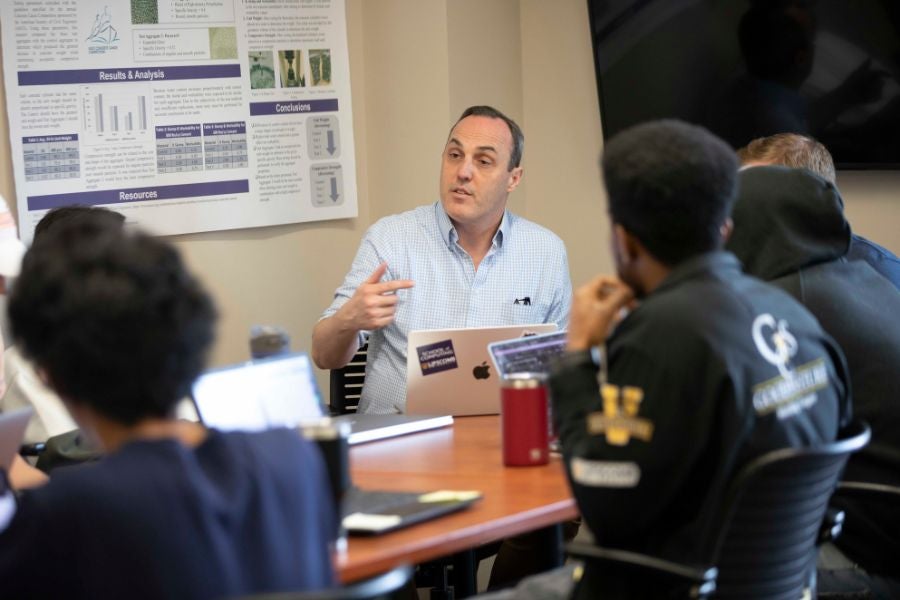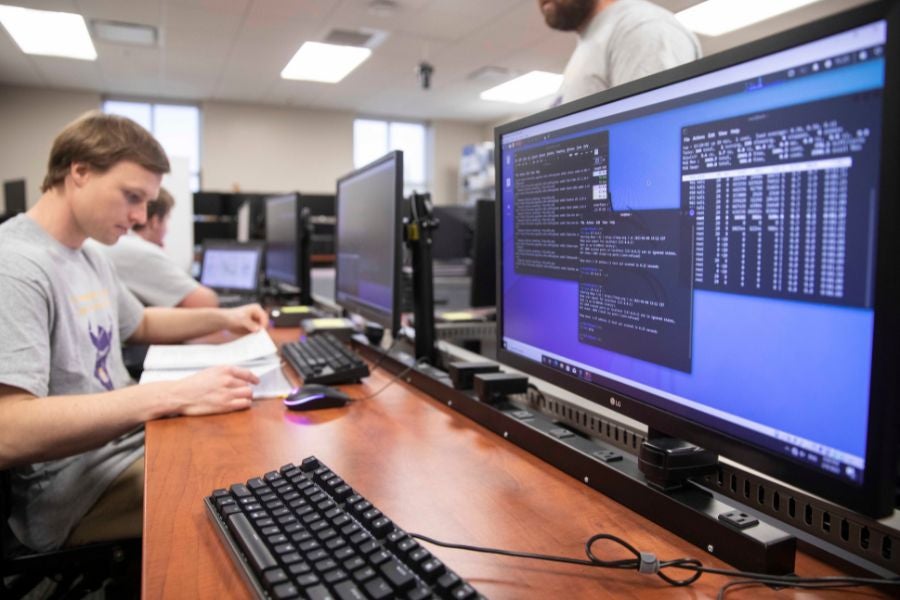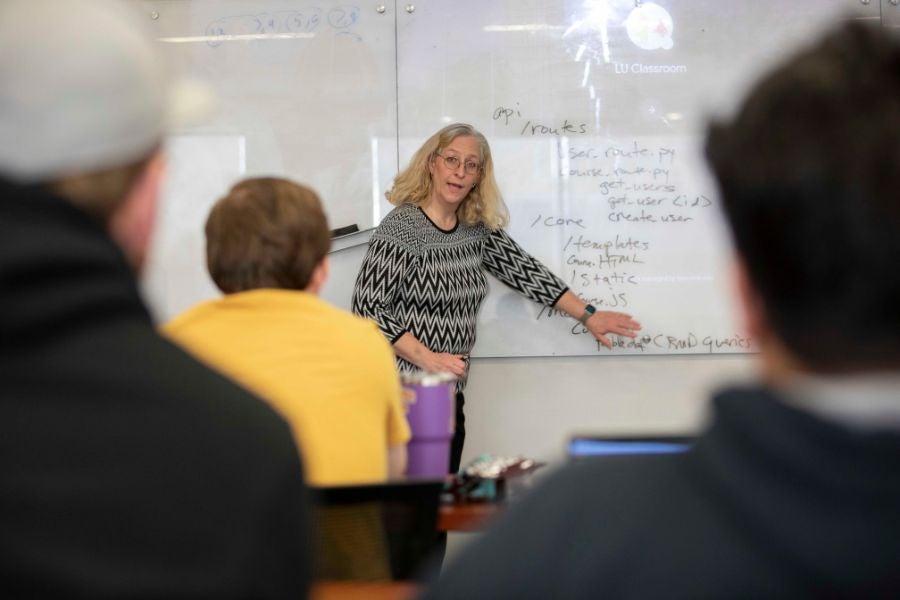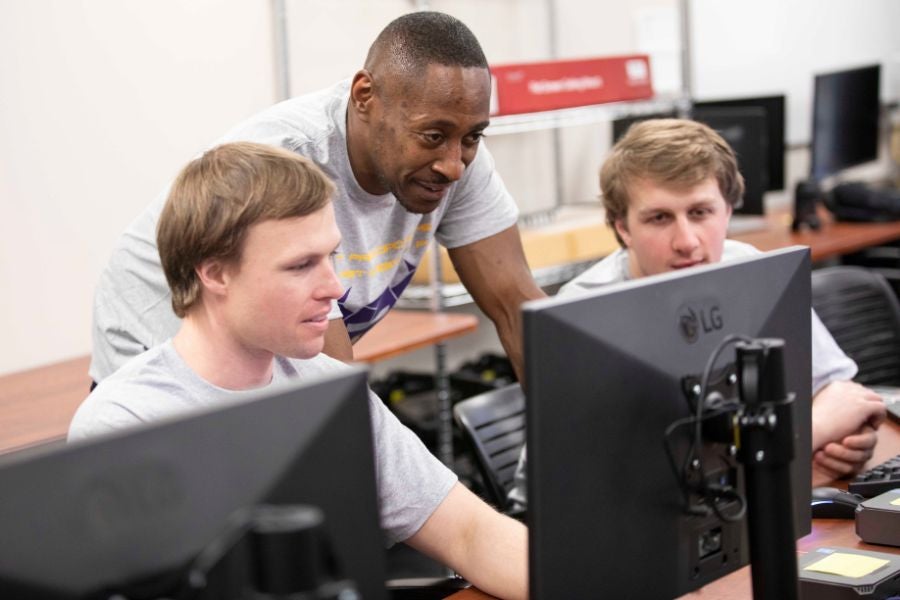School of Computing established in the engineering college
New school offers real-world curriculum, equipment and resources for future software developers and cyber-defenders.
Janel Shoun-Smith |

Associate Dean Steve Nordstrom teaching in the Software Studio course, a real-world, collaborative course designed to prepare students for the working world in software development.
The technology sector has become a key industry fueling Nashville’s rapid growth. As part of continuing efforts to equip students for success in technology careers, in 2022 the university established the School of Computing within the Raymond B. Jones College of Engineering.
The establishment of the new school will offer opportunities for growth in the college’s existing programs, development of new degrees and certificate programs, integration of other academic disciplines and new partnerships in the tech industry, with employers and through applied technology opportunities.
The school is led by Associate Dean Steve Nordstrom, who holds a Ph.D. and M.S. degrees in electrical and computer engineering from Vanderbilt University, and a B.S. in electrical engineering from Tennessee Technological University.

The school faculty includes Bryan Crawley, associate professor; Ken Mayer, assistant professor; Chris Simmons, associate professor; Dwayne Towell, associate professor; Amy Algood, assistant to the associate dean; and Susan Hammond, former chair of the Department of Computer Science at Faulkner University, who joins the faculty as associate professor and chair of the department of computer science. Prior to entering higher education, Hammond spent 13 years in industry as a software developer and project manager.
The school offers four majors: computer science, software engineering, cybersecurity and information technology, and its more than 130 students make up about a third of the total engineering college’s student body today.
“This gives us a much better coherence when it comes to the offerings coming out of the School of Computing,” said Nordstrom. “Most universities have computing majors aligned with engineering.
READ MORE: Learn more about the college's new student cyber defense team, who competed in February.

Susan Hammond has joined the faculty as associate professor and chair of the department of computer science.
“In the past, engineering students, who focus on technology infrastructure, have had access to electives that taught software topics. Now with engineering in-house, we have already started collaborating on how to teach that material to a larger audience. We don’t have to pick and choose courses relevant for electrical and computer engineering; we are co-designing that curriculum now, and it is advantageous in terms of efficiency and brings good decision making to the curriculum.”
In support of the new school, the W. Ralph Butler Computer Lab has been moved to the Fields Engineering Center and been revamped to support the cybersecurity and information technology programs offered by the school and the Software Studio course has been added to the engineering college curriculum.
Software Studio is a simulated workplace environment designed to teach students the fundamentals of software engineering in a real-world setting, said Nordstrom. Students meet twice a week to work at their software development “company” called Lunatic Labs.
Throughout two years of college, 30 to 35 students each semester progress through four roles in the company: junior developer, developer 1, developer 2 and team leader.
“Students must manage and deliver a software product in the same way they would be if they were hired in the industry,” said Nordstrom. “There are no tests and no lectures. Grading is based on metrics tracking the company progress, the same as it is in the industry.”
Metrics include measurements such as how much code is produced, when clocked in or not, how much communication they do, among others. “Their grade in the class is a reflection of their performance—a lot like an internship,” he said.

The program, enacted two years ago (within the former College of Computing and Technology), has been very successful, said Nordstrom. “Potential students and parents have good feedback on the course and graduates are landing dev-II level jobs straight out of college based on their experience in Software Studio. That is typically a salary jump of $10,000 to $15,000 compared to entry level positions.”
“We’re trying to get students jobs that have the most impact, and the best way to do that is for them to have skills they can use to lock in a non-junior level job immediately,” he said.
The W. Ralph Butler Computer Lab is designated for cyberdefense courses and activities only, as the computers are purchased especially to allow faculty “hackers” to infect them with plenty of viruses and security gaps to teach students defensive strategies. If a computer becomes too infected to operate, these low-cost machines can be easily disposed of and replaced, said Nordstrom.
“This is one of the reasons why engineering is a good partner for computing programs, because this lab was designed perfectly for our needs,” said Nordstrom. “These students own the space and run the space.”
As all the computers are infected, the lab has keycard access only for cyberdefense faculty and students. The secure lab allows students to carry out long-term projects that may run on a computer for days. In addition to classes, the college’s student cyberdefense team uses the lab to prepare for its annual competition in February.